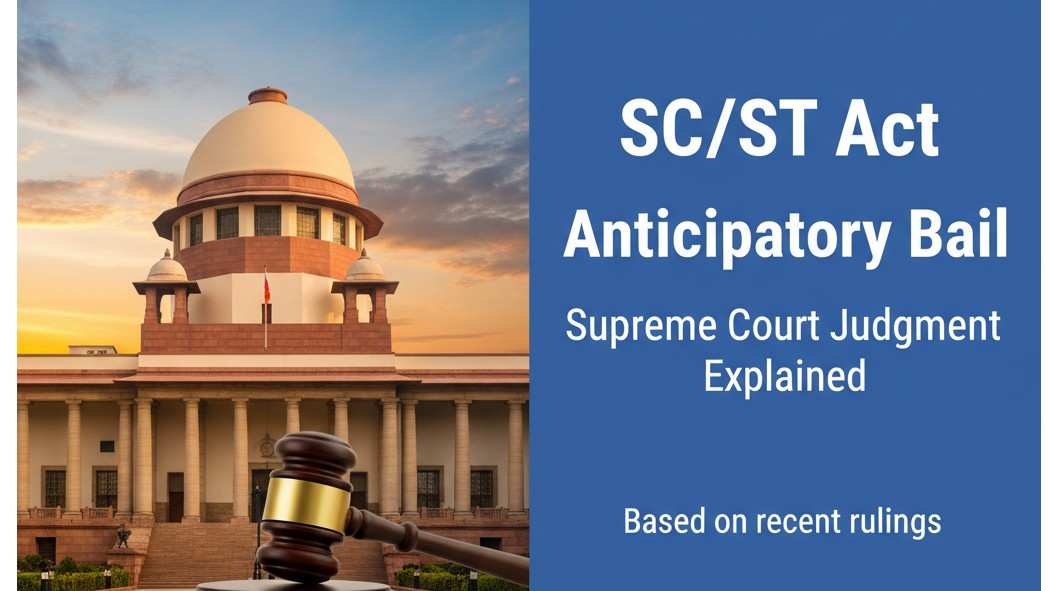SC/ST Act Anticipatory Bail has always been a sensitive legal issue in India. The SC/ST (Prevention of Atrocities) Act, 1989, was designed to protect Scheduled Castes (SC) and Scheduled Tribes (ST) from caste-based crimes. One of its strict provisions is Section 18, which generally bars anticipatory bail.
In the recent landmark case Kiran vs Rajkumar Jivraj Jain & Anr (2025), the Supreme Court clarified the circumstances under which anticipatory bail may or may not be granted under this Act.
Here are five key insights from the judgment.
Section 18 Bars Anticipatory Bail by Default
The Supreme Court confirmed that Section 18 of the SC/ST Act prevents accused persons from seeking anticipatory bail. This bar is intended to ensure that perpetrators of caste-based crimes cannot use pre-arrest bail to avoid immediate legal scrutiny and protect victims from intimidation or harassment.
Takeaway: If the FIR discloses a prima facie offence under the SC/ST Act, anticipatory bail is generally unavailable.
A Narrow Exception Exists
The Court clarified that anticipatory bail may be granted only in exceptional cases where the FIR itself fails to show a prima facie offence. This means that if the allegations on the face of the FIR do not meet the statutory requirements of an offence under the Act, the accused may be considered for anticipatory bail.
Takeaway: Courts will scrutinize the FIR to determine whether it actually discloses a legal offence.
Balancing Victim Protection and Accused Rights
The judgment emphasizes the importance of protecting victims while safeguarding against misuse. While the Act prioritizes protection for SC/ST communities, the exception ensures that individuals falsely accused are not unjustly deprived of their liberty.
Takeaway: Only in cases where the FIR is clearly baseless can anticipatory bail be considered, maintaining a careful balance between the rights of the victims and the accused.
Practical Implications for Police and Courts
With this ruling:
- Police can proceed with arrests under the Act without anticipatory bail hurdles in most cases.
- Lower courts must assess the FIR to determine whether it meets the prima facie standard before considering bail.
Takeaway: Investigations are expected to move faster, and courts have a clear framework to assess anticipatory bail applications.
Long-Term Legal Impact
This ruling sets a binding precedent for all lower courts in India. It clarifies that anticipatory bail under the SC/ST Act is extremely limited and can only be considered when the FIR shows no prima facie offence. This strengthens the Act’s intent to protect vulnerable communities while discouraging frivolous or false claims.
Takeaway: Legal practitioners and accused persons must adjust their litigation strategies in line with this judgment, focusing on the FIR’s content and legal sufficiency.
FAQs on SC/ST Act Anticipatory Bail
Can an accused get anticipatory bail under the SC/ST Act?
Generally, no, except when the FIR does not disclose any prima facie offence.
Why is anticipatory bail restricted under Section 18?
To protect SC/ST victims from intimidation or harassment and ensure effective enforcement of the Act.
What if the FIR is false?
Courts can grant anticipatory bail only if the FIR clearly lacks the ingredients of a statutory offence.
How does this ruling affect ongoing cases?
Courts now have clear guidance: grant anticipatory bail only in exceptional cases where the FIR is legally insufficient.
Does this judgment affect victims’ protection?
No. It strengthens the Act’s protective purpose while allowing limited relief for wrongly accused persons.
Conclusion
The Supreme Court’s decision in Kiran vs Rajkumar Jivraj Jain reinforces that anticipatory bail under the SC/ST Act is generally barred. Only in rare situations where the FIR does not establish a prima facie offence can bail be considered. This judgment provides clarity for courts, police, and legal practitioners, ensuring the Act continues to safeguard vulnerable communities while addressing concerns of misuse.

























